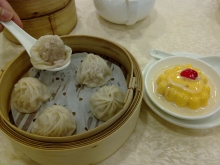
Do you have a hard time deciding what you are going to add into your food? Curious? What are the ingredients and usages? Let's look at the basic types of dark sauces:
Asian countries: Soy sauces, Fish sauce, Oyster sauce, Barbecue sauce, Sesame sauce, Mixture of soy sauce or fish sauce and other ingredients (salt, sugar, chili, rice wine or vinegar, honey) In western countries: Worcester sauce, Barbecue sauce, Balsamico sauce and dressing, etc...Well, all look similar or the same!! How could you tell, it has just different taste and may be thicker sauce. Some of them are used only for cooking and some of them can be used as a dipping sauce.
Balsamico can be in liquid form or thick sauce (glacing). Balsamico liquid is usually for cooking and making salad dressing. The glacing sauce is for Italian salad dressing and grilled meats or a plate decoration in French cuisine:
The dark soy sauces have many different ingredients and tastes.
Type 1 : Sweet & Salty
It could be one of these sauces:
A. Sweet dark soy sauce which contains sugar, water and soy sauce (thick soya sauce)
Consistency: thick sauce
It can be cooked to make fried rice or noodles:
* Using more soya sauce will not give you this dark rice, but more salty instead. Be careful! Let's compare fried rice with sichuan sauce:
It can be used as gravy for noodles menu:
or stir fried dark soy sauce noodles:
or fried with salty daikon and meat on soft rice dumplings:
B. Hoisin sauce which Ingredients are:
C. Teriyaki sauce which contains
Consistency : fluid
Type 2: Sour & Salty (vinegar+salt/soya sauce)
A. Shoyu ramen sauce (soya sauce in meat/fish-based broth, sometime with mirin/sake or miso)
Type 3: Sweet & Sour & Salty (sugar+sweet&sour fruits, either dark or transparent)
A. Plum sauce (can be from fresh, preservative or dried plums)
Here are dried Chinese plums:
B. Thai sweet & sour sauce (rice vinegar+chilli+fish sauce/salt) It is not really a dark sauce, but light transparent yellow-orange with chillis that you can see. If ketchup is added to this-->dark sweet&sour sauce.
C. Chinese sweet & sour sauce (variety of local ingredients)
Some restaurants may add this ingredient to get a unique taste:
Consistency: thick fluid
This type of sweet and sour sauce fits for all kinds of crispy food:
Type 4: Salty with flavor
Consistency: dark and thick sauce
A : Oystersauce
Oyster sauce is a thick dark sauce or seasoning from China. It is common used for cooking with meat and vegetable menu in the Southeast Asian countries.
Fried noodles:
* The chinese white noodles for stir fried noodle tastes different from japanese white noodle (ramen) although it may look the same:
Type 5: Extremely Salty (fermented mixture)
Consistency: liquid
A: Fish sauce
B: Soya sauce
C: Worcestershire sauce or Worcester sauce, including other brands with similar secret mixture that make you addicted (food enhancer).
Let's start with chinese ravioli-jiaozi, generally is served with salty liquid sauce:
But once something similar to this is baked or deep fried form (Gyoza), it is served with sweet and sour/salty tastes in thick sauce:
This lunch set in Taiwan could give someone a headache when there are many sauces on the table. Which sauce fits to one of them?
Once you can manage it, you pass the test, Congratulations! If not, you can eat them without any sauce anyway. May the sauce be with you!










